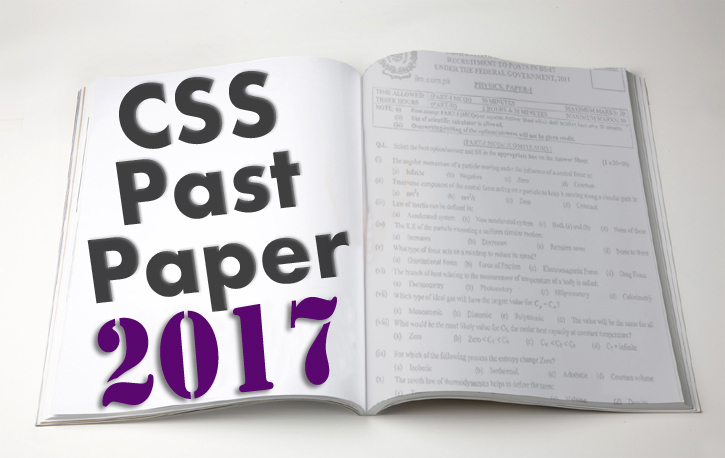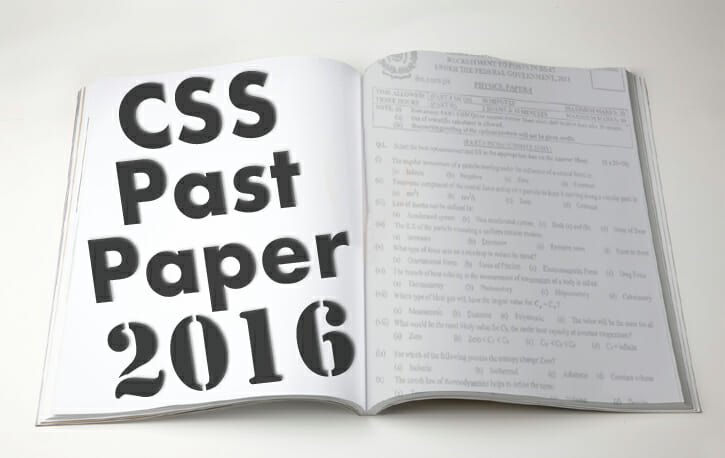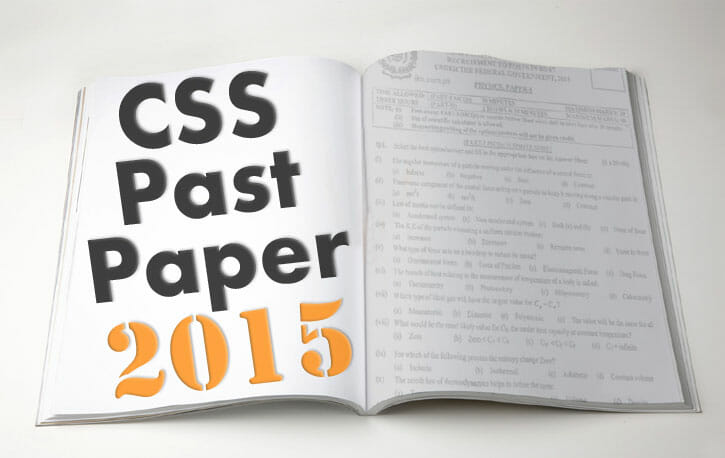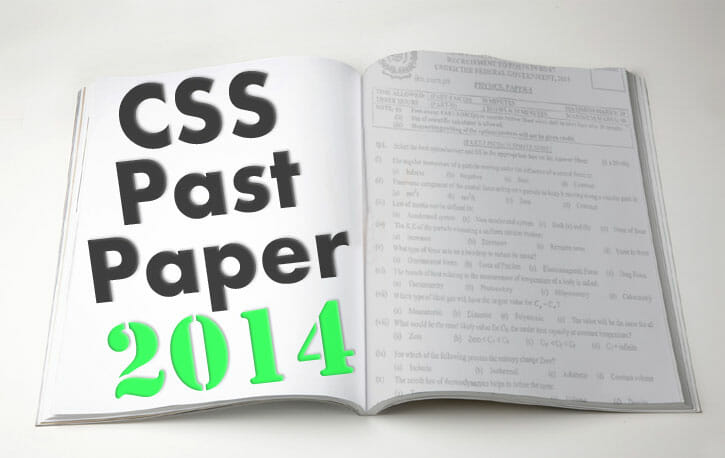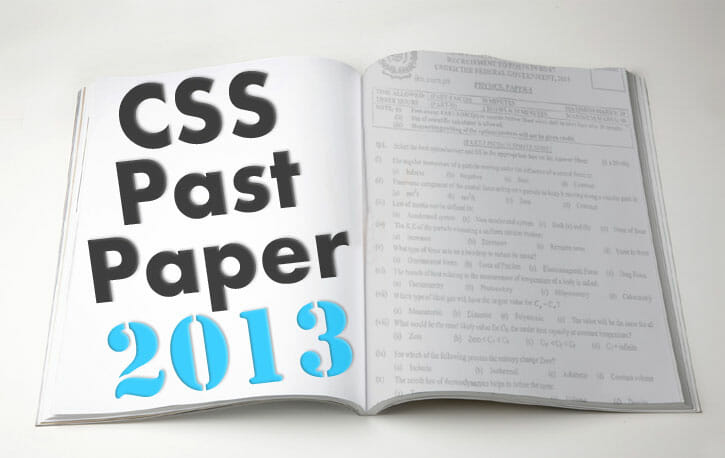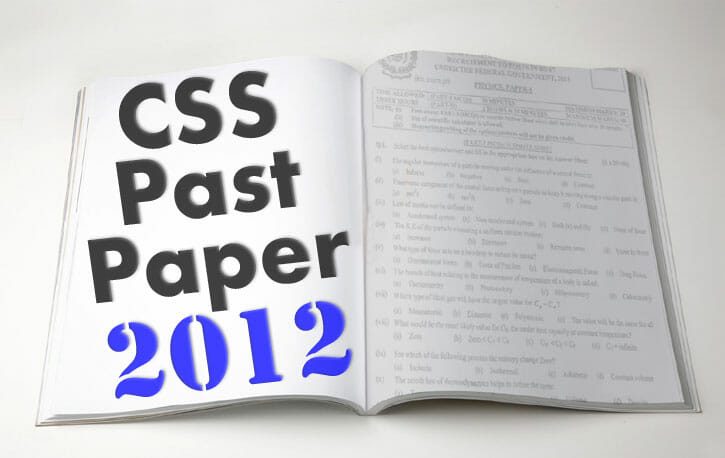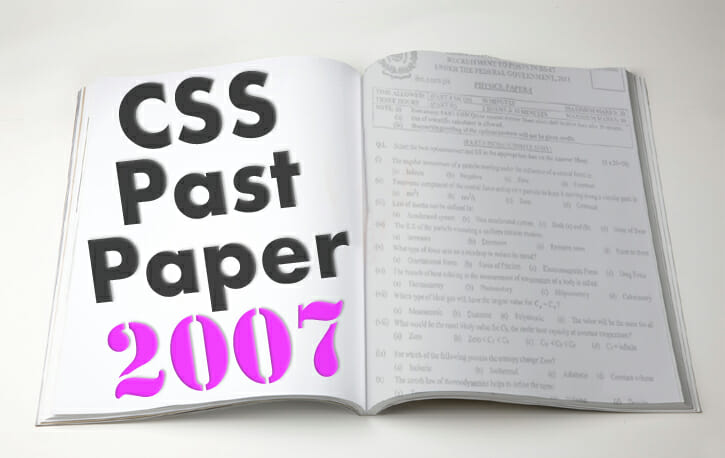FEDERAL PUBLIC SERVICE COMMISSION
COMPETITIVE EXAMINATION FOR RECRUITMENT TO POSTS
IN B.P.S. -17, UNDER THE FEDERAL GOVERNMENT, 2007
GENERAL KNOWLEDGE PAPER- I
(PAKISTAN AFFAIRS)
Time Allowed: 3 Hours Maximum Marks: 100
Note: (i) Attempt ONLY FIVE questions in all, including QUESTION NO. 1, which is COMPULSORY. All questions carry EQUAL marks.
(ii) Extra attempt of any question or any part of the attempted question will not be considered.
(iii) Candidate must draw two straight lines (======) at the end to separate each question attempted in Answer Books.
Q.1. Write only the correct answer in the Answer Book. Do not reproduce the question.
(1) The first Muslim general entered Victorious in the sub-continent Indo-Pak in the year:
(a) 612 AD (b) 712 AD
(c) 812 AD (d) None of these
(2) On the execution of Muhammad Bin Qasim, the rule of Caliph ended and Arab princes in Mansura (Sindh) and Multan (Punjab) established their independent dynasties in Sub-continent in the year:
(a) 861 AD (b) 871 AD
(c) 881 AD (d) None of these
(3) Who became the first Sultan of newly established Muslim Sultanate of Delhi in 1207:
(a) Shahabudin Ghuri (b) Qatub-din Aibek
(c) Zaheer-ud-din Babar (d) None of these
(4) Who has written the book entitled “The Making of Pakistan?”
(a) Qurashi I. H. (b) Muhammad Ali Ch.
(c) Waheed-uz-Zaman (d) None of these
(5) Who was first appointed Nazim of Nadva-ul-Ulema in 1883?
(a) Maulana Shibli
(b) Maulvi Abdul Ghafoor
(c) Maulana Syed Muhammad Ali
(d) None of these
(6) Pakistan’s ideology is based on the ideals of:
(a) Democracy (b) Theocracy
(c) Islam (d) None of these
(7) Quaid-e-Azam called Islam “Our bedrock and sheet anchor” while addressing:
(a) Punjab Students Federation
(b) Muslim Students Peshawar
(c) Indian Muslims
(d) None of these
(8) The resolution for formation of All-Indian Muslim League was passed at the meeting of All India Education Conference (1906) and was moved by:
(a) Nawab Viqar ul Mulk (b) Nawab Mohsin ul Mulk
(c) Nawab Salim ullah (d) None of these
(9) The demand of separate electorate for Indian Muslims was first accepted in the Act of:
(a) 1909 (b) 1919
(c) 1935 (d) None of these
(10) The provincial governments of Congress resigned and All-India Muslim League as a mark of relief observed the “Day of Deliverance” on:
(a) 22 Oct. 1939 (b) 22 Nov. 1939
(c) 22 Dec. 1939 (d) None of these
(11) The Lahore Resolution was amended and Pakistan was made part of League’s objective. The amendment was made in the Annual session (1941) of All India Muslim League, which was held at:
(a) Karachi (b) Lahore
(c) Madras (d) None of these
(12) Radcliff Commission submitted its formula for the division of India in to two countries to Lord Mountbatten on:
(a) 9 August 1947 (b) 19 August 1947
(c) 29 August 1947 (d) None of these
(13) Ch. Rahmat Ali, the architect of the name of the Pakistan, died on:
(a) Feb. 2, 1951 (b) Feb. 12, 1951
(c) Feb. 22, 1951 (d) None of these
(14) Liaquat Ali Khan, the first Prime Minister of Pakistan, while addressing a meeting at Rawalpindi was assassinated on:
(a) Oct 6, 1951 (b) Oct. 16, 1951
(c) Oct. 26, 1951 (d) None of these
(15) The Legal Framework Order, which amended a constitution of Pakistan unilaterally was issued by:
(a) Yahya Khan (b) Ayub Khan
(c) Zia-ul-Haq (d) None of these
(16) The country, which supported the Pakistan Movement before the emergence of Pakistan:
(a) Iran (b) Indonesia
(c) Saudi Arabia (d) None of these
(17) Durand Line, which divided the border of Pakistan and Afghanistan, is as long as:
(a) 2252 Km (b) 2262 Km
(c) 2272 Km (d) None of these
(18) Which mountain range is located between China and Pakistan?
(a) Siwaliks (b) Hindukush Range
(c) Great Himalayas (d) None of these
(19) What is the total area of Pakistan (in square kilometer)?
(a) 695095 (b) 795095
(c) 796096 (d) None of these
(20) The Regional Cooperation for Development (RCD) was established among Pakistan, Iran and Turkey in 1964 and was annulled in:
(a) 1969 (b) 1979
(c) 1989 (d) None of these
Q.2. Critically evaluate the contribution made by missionaries in the growth of Muslim society in the Sub-continent of Indo-Pak.
Q.3. The Deoband School stood for “definite religio-political goals with limited sphere of influence.” Discuss.
Q.4. Elucidate Ideology of Pakistan. What are the reasons which contributed for the development of two-nation theory? Is two-nation theory relevant after the fall of Dacca? Discuss
Q.5. Minto – Morely Reforms was a “tool of change” in the political system of India. Discuss it with special reference to the demands of Simla Deputation.
Q.6. Local government system under the “Devolution of Power Plan 2001” has miserably failed in delivering services to the masses. Discuss.
Q.7. “Pakistan is a federation in form and unitary in spirit.” Discuss it keeping in view the strengths and weaknesses of Federation of Pakistan.
Q.8. Highlight the salient features of National Education Policy of 1998-99. How can we improve the education standard of people of Pakistan?
